Bridging the Gap – November 2023
The first step towards getting somewhere is to decide that you are not going to stay where you are.
J.P. Morgan
Hello and a warm welcome to my latest blog. Tomorrow (Friday 1 December 2023) is a hugely significant milestone as it marks exactly one year since the launch of the new NIHR Manchester Biomedical Research Centre (BRC).
We’re building research capacity and leveraging new income to drive forward innovation. Our Clusters are working well together, our team has grown and the integrated model of the BRC is operating in a productive way. We’re galvanising our teams to continue to develop advances and we’re beginning to identify key areas of synergy across the various themes.
We recently issued our first strategic ‘Core Pump Priming Call’ to support new cross-theme, cross-cluster research projects or collaborations, which will tackle wider health issues. I hope to bring you news of successful projects in the new year.
Thank you also to our public contributors who have worked hard over the past year supporting our activities, governance structures and embedding themselves within all our themes.
We’ve recently welcomed our new cohort of PhD students (pictured right) with a BRC induction session in November where we introduced the BRC and the opportunities available through our infrastructure. As a BRC, we look forward to supporting this cohort and reporting on their successes.
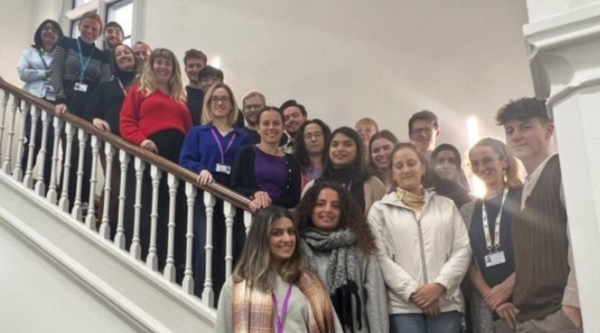
We have also published several different strategies to help guide our work. In collaboration with the NIHR Manchester Clinical Research Facility (CRF), we published our first Equality, Diversity and Inclusion (EDI) Strategy, which you can read on the BRC website.
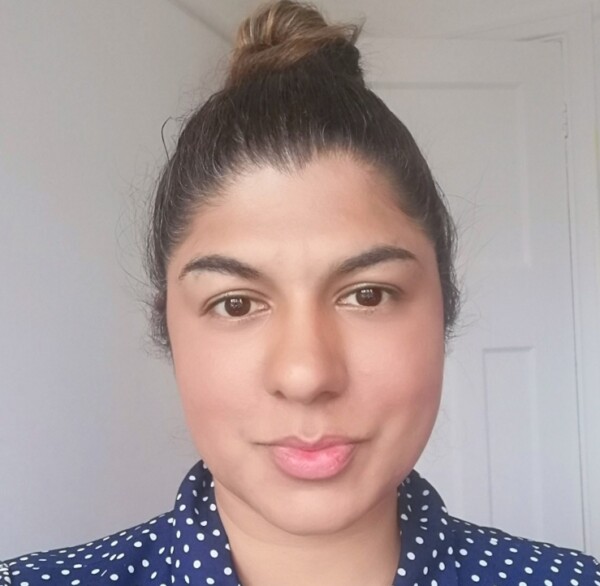
I am also delighted to announce the appointment of Dr Fozia Ahmed (pictured left), our new EDI Lead for Manchester BRC and Manchester CRF who will drive the delivery of this joint Strategy, working with a new EDI coordination team, with colleagues from across our BRC and CRF partner organisations. Dr Ahmed is a consultant cardiologist who brings a wealth of experience to the role, and together with a growing team focused on EDI, she will lead us in putting EDI at the heart of everything we do. I know Dr Ahmed will provide strong leadership to help progress our EDI ambitions.
In October, we welcomed visitors from the Department of Health and Social Care and the National Institute for Health and Care Research (NIHR) and provided a forward look of the work our research themes will aim to address over the next 5 years to make the most impact. Manchester University NHS Foundation Trust (MFT) hosted the site visit (pictured below) with delegates hearing updates regarding our contributions to the national research infrastructure, digital health, industry engagement and inclusive research. Thank you to everyone who supported and contributed to this visit. It provided an excellent opportunity to showcase our strengths in collaborative working, and our focus on reducing health inequity and improving inclusivity.
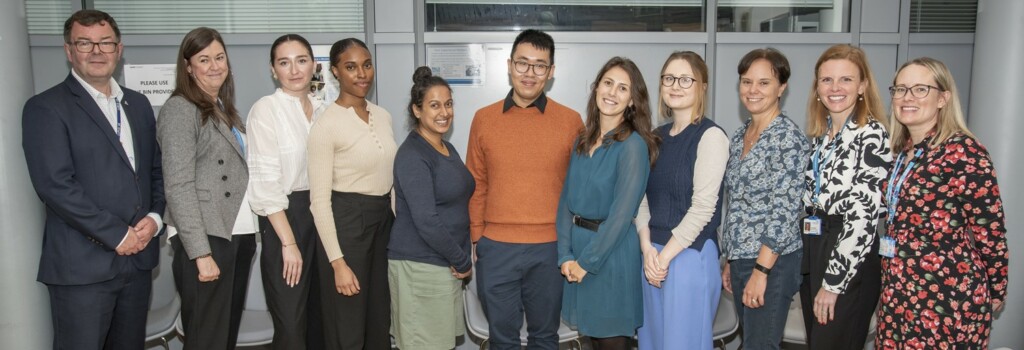
As we reflect on our first year, next month we will be launching a new series called ‘Spotlight On’. These short films will shine a light on different areas of Manchester BRC, highlighting the range and impact of our cutting-edge research and how we deliver this through our aims to build, embed and accelerate. Firstly, we will be focusing on the BRC’s Cluster model starting with the Inflammation Cluster, introduced by Cluster Lead, Professor Anne Barton. Please do look out for this by following Manchester BRC on our social media channels X/Twitter and LinkedIn.
Wider BRC news, awards and accolades from across our Clusters and Themes
Cancer
- Dr Sacha Howell (pictured right), investigator on our Cancer Prevention and Early Detection (PED) theme featured on ITV’s Good Morning Britain and Granada Reports to discuss BCAN-RAY, a pioneering cancer research project, at Wythenshawe Hospital’s Nightingale Centre, to improve survival rates in younger women, in memory of the singer Sarah Harding, who sadly died from breast cancer, aged 39.
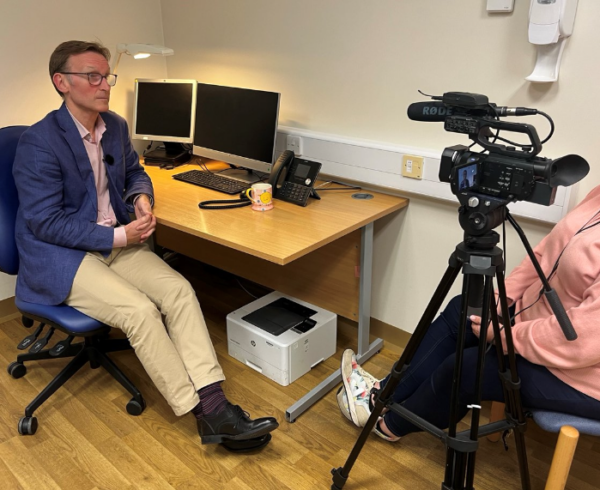

- Congratulations to Dr Kelechi Njoku (pictured left) who has been awarded the first 3-year Eve Appeal Fellowship to develop a simpler and kinder test for detecting womb cancer. His research is linked to our PED theme.
- Our Living With and Beyond Cancer (LWBC) theme hosted an educational event at The Christie which provided updates on their latest findings, focussed on improving the lives of those living with cancer treatment. LWBC Senior Research Manager, Dr Louise James has written a blog outlining her personal insights about the education day and what working in research means to her.
- Manchester BRC researchers also played a leading role in early studies which demonstrated the benefits of a risk-reducing treatment for breast cancer, which will help thousands of women. Anastrozole, which has been used for many years to treat the disease, was recently licensed as a preventative option, and received widespread media coverage.
- Congratulations to Professor David Thomson and Dr Agata Rembielak from our Advanced Radiotherapy theme named MAHSC Honorary Clinical Chairs 2023 for their contribution to patient care and health research in Greater Manchester.
- Season 2 of Manchester Cancer Research Centre’s podcast series One in Two has been released with BRC researchers playing a key role. Professor Caroline Dive, Cancer Precision Medicine Co-Theme Lead, discusses cancer biomarkers and how liquid biopsies could pave the way for lung cancer detection and treatment. Professor Corinne Faivre-Finn, Advanced Radiotherapy Programme Lead talks about how the RAPID-RT clinical trial could improve survival. Please do give these a watch or listen if you can.
Inflammation
- Respiratory Medicine researchers were part of a study team that discovered disturbed sleep patterns in patients hospitalised with COVID-19 were likely to be a driver of breathlessness. Thank you to Davine Forde (pictured right), member of the BRC’s Governance Board, who talked about her own lived experiences in this article.
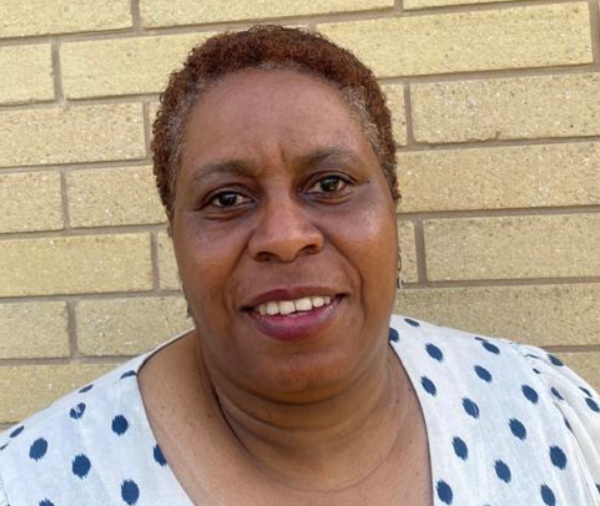
- Professor Dave Singh, chronic obstructive pulmonary disease (COPD) Programme Lead and Dr Simon Lea, published an exciting new paper which evidences the science behind COPD treatment guidelines which advocate the personalised use of corticosteroid inhalers to target inflammation. This review brings together the authors’ long history of research into biomarkers and basic science which have transformed clinical practice and was published in the European Respiratory .
- In our latest contributions to Arthritis Digest, a magazine for people with arthritis that highlights relevant research and reviews topical issues, BRC researchers Professor John McBeth and Dr Katie Druce, from our Rheumatic and Musculoskeletal Diseases theme, highlighted how digital technology can forecast and manage chronic pain. This empowers patients living with musculoskeletal disease. Dr Sarah Dyball, Clinical Research Fellow at UoM and The Kellgren Centre for Rheumatology at MFT, explains what undifferentiated connective tissue disease (UCTD) is and why more research is needed. We are working to understand the genes and pathways involved in UCTD, which will allow us to move towards better markers for diagnosis, widen our understanding of the disease and develop new treatment options.
- Researchers including Professor Maciej Tomaszewski, Co-Lead for our Integrative Cardiovascular Medicine theme, have shown for the first time that a drop in the levels of an enzyme in the kidney is associated with high blood pressure.
- Manchester BRC also supported research which revealed the genetic underpinnings of blood pressure regulation, offering hope for more effective treatments and preventative measures for hypertension.
- Dr Matthew Harries and Dr Talveen Purba, Inflammatory Hair Diseases Programme Co-Leads in our Dermatology theme showcased their work at the UK Symposium on Hair and Scalp Disorders (pictured below), held in Manchester recently. Read more about their work, including the clinical management of the inflammatory hair loss disorder alopecia areata.
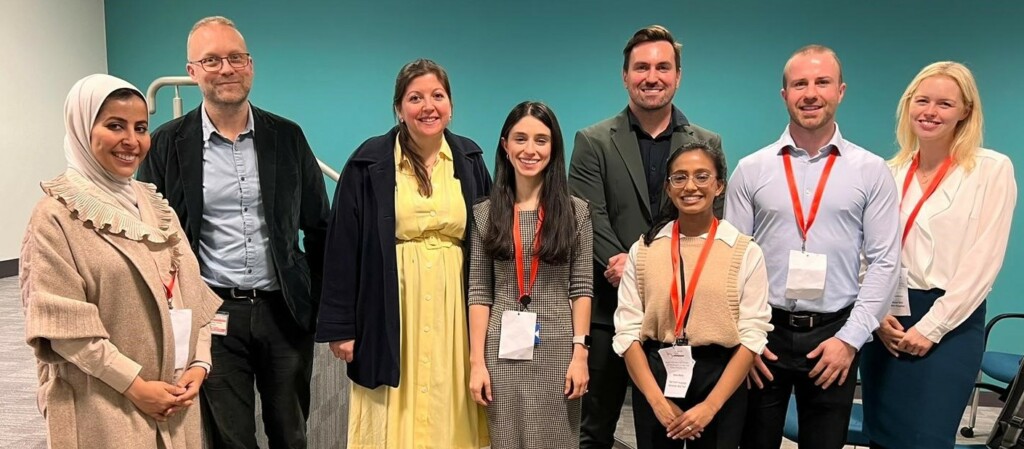
High-burden Under-researched Conditions (HURC)
- Well done to Dr Emanuele Perugia, Professor Gabrielle Saunders and Dr Samuel Couth from our Hearing Health theme who won the ‘People’s Choice’ poster award at the Basic Auditory Science meeting. Research Associate Emanuele has also recently been appointed as Vice Chair for the British Society of Audiology (BSA) Electrophysiology Special Interest Group. The BSA encompasses academic researchers and members of the public in advancing the knowledge, learning, practice and impact in hearing and balance. Congratulations!
- Hearing Health researchers also had 5 of the top 10 research outputs published in the International Journal of Audiology. These included the top two papers; One year on: an updated systematic review of SARS-CoV-2, COVID-19 and audio-vestibular symptoms and Persistent self-reported changes in hearing and tinnitus in post-hospitalisation COVID-19 cases. You can see the full list on Altmetric..
- Dr Hannah Cross, a Postdoctoral Research Associate working at the Manchester Centre for Audiology and Deafness at UoM, wrote this article for The Conversation, sharing her latest findings on hearing loss and dementia. Hearing Health researchers also developed the first reliable test for dementia in people with hearing loss.
- Several researchers across our Hearing Health, Mental Health and Rare Conditions themes were awarded pump-prime grants, following the first networking event for the HURC Cluster earlier this year. Projects were awarded across 3 areas involving cross-theme working which is fantastic to see and I look forward to watching these collaborations develop.
Disease Complexity and Multi-morbidity
- I was delighted to see our Disease Complexity and Multimorbidity Cluster hosted their first networking event (Co-Theme Leads pictured below). This Cluster brings together new themes of Next Generation Phenotyping and Diagnostics (NGPD) and Next Generation Therapeutics (NGT), which aim to accelerate new diagnostics and precision therapies towards later stage development. The event was a great opportunity for colleagues to introduce the work the Cluster is doing, explore any areas of common interest and drive forward ideas for cross collaboration.
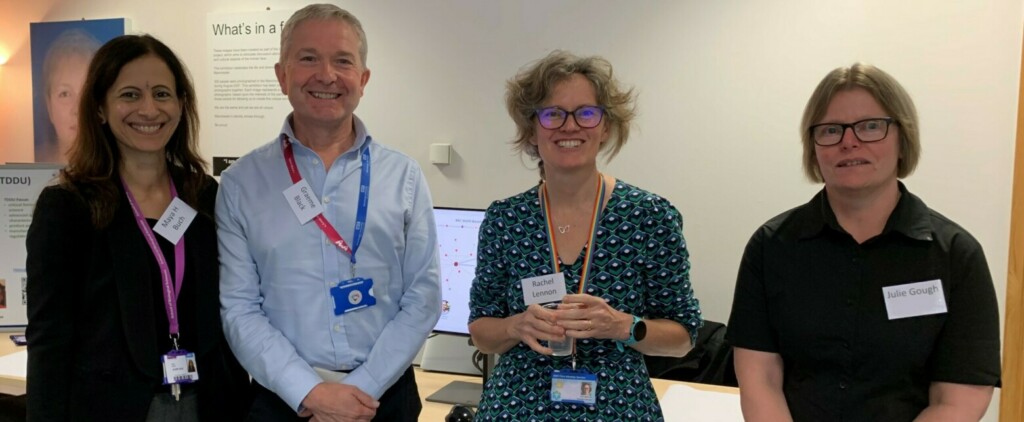
- Our NGPD theme’s ‘Gene Editing Service’ funding call opened for applications in autumn. The remit of this call was to support phenotyping and diagnostics of disease and I’ll bring you news of awarded projects soon.
******
Congratulations to recently-appointed Co-Theme leads, Professor Gabrielle Saunders, for Hearing Health, Professor Stephen Fowler, for Respiratory Medicine and Professor Roger Webb for our Mental Health theme. I wish you all the best in your new roles. I would also like to thank previous Co-Theme leads Professor Kevin Munro (Hearing Health), Professor Angela Simpson (Respiratory Medicine) and Professor Shon Lewis (Mental Health) for their invaluable contributions both in preparation for this BRC and their leadership of their respective themes over the past 12 months.
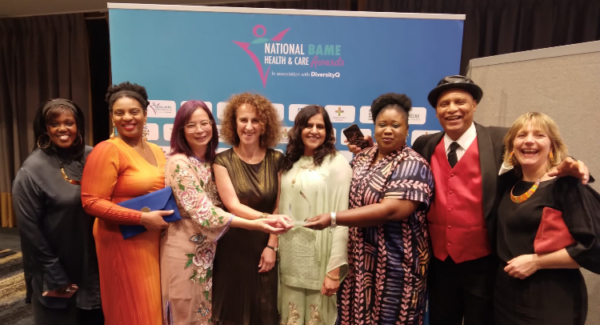
Huge well done to the Black, Asian and Minority Ethnic Research Advisory Group (BRAG), facilitated by Vocal, who won the award for Community Initiative of the Year at the National BAME Health and Care Awards 2023 (pictured left). BRAG is a group of community leaders who work to bring a focus on race equity, inclusion and effective community engagement to health research in Greater Manchester. Congratulations on this fantastic recognition.
You may have also seen recent news that MFT is to host a new NIHR Research Delivery Network (RDN), which will start in 2024, to support the successful delivery of health and social care research in England. As part of the transition to the North West Regional RDN, the existing NIHR Greater Manchester and North West Coast Local Clinical Research Networks (LCRNs) will merge to form a single service covering the whole region, serving more than 7 million people. We work closely with the CRN and look forward to working closely with the RDN across the wider North West which maps closely to where our partner Trusts are located.
As part of a new £42m government funding scheme, the NIHR has also awarded MFT almost £3m from 1 April 2024, to create the NIHR Manchester University NHS Foundation Trust HealthTech Research Centre (HRC). This will be one of 14 HRCs across England and will transform urgent and emergency care. The Health TechResearch Centres will work closely with our themes including the NGPD theme to accelerate innovation through to routine clinical practice.
In further news, the NIHR recently awarded more than £96 million to 93 NHS organisations as part of a capital investment – with £2.26 million awarded to MFT to support cutting-edge research and innovation delivered by Manchester BRC.
I am also very pleased to share some early career successes with the awarding of two fellowships. Stuart Wright, Research Fellow in health economics at UoM, has been awarded a Wellcome Trust Early Career Award for; Producing Economic Evidence to Inform and Improve the Implementation of Cancer Screening Programmes. Garima Dalal, Research Associate in health economics at UoM has been awarded an NIHR Doctoral Research Fellowship for; Inclusivity in uptake: impact on the cost-effectiveness of a targeted lung screening programme. Awards such as these underscore the relevance of our aim of providing ‘personalised health and care for all’ and will help our researchers provide a strong evidence base to inform the wider development of cancer screening programmes across our whole community.
Events and opportunities
The latest event in our Training Event and Seminar Series, took place earlier this week, and focused on our Inflammation Cluster. Theme Co-Leads Professor Richard Warren (Dermatology), Professor Stephen Fowler (Respiratory Medicine), Professor Andrew Morris (Rheumatic and Musculoskeletal Diseases) and Professor Bernard Keavney (Integrative Cardiovascular Medicine) introduced their research themes, before looking at experiences of using Hive (MFT’s electronic patient record system) for research. The next event in the series will be ‘Digital Infrastructure’ on 28 February 2024.
Building on relationships with colleagues across the North West, the Northern BRC Early Career Researchers (ECR) Conference in Leeds also took place in November, with a Team Research theme. I attended along with Lisa Miles, Operational Director and Professor George Moulton, Capacity Building Lead. We were joined by 3 ECRs from Manchester BRC, Dr Ran Wang (Respiratory), Dr James Eales (Cardiovascular) and Dr Matthew Parkes (NGT), who presented at the event. Such events further strengthen our collaborations with the Northern BRCs. They also provide an excellent platform for our ECRs to build new links with colleagues across the North who are involved in similar research programmes.
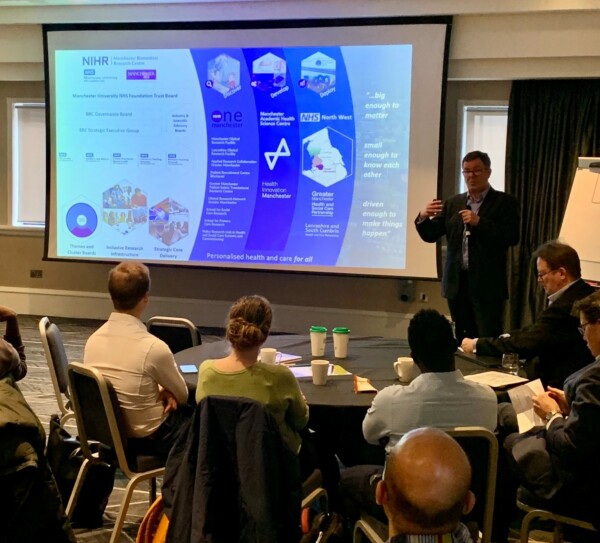
Members of our Core Team represented Manchester BRC at the Great North Research Conference 2023 earlier this month. The conference showcased the brilliant research happening in the north of England and demonstrated what the area can offer the Life Sciences and medical technology industries.
Core Team colleagues also attended the official opening of the Christabel Pankhurst Institute for Health Technology and Innovation’s flagship building on Manchester’s Oxford Road Corridor. Read more about how this development will support and facilitate better collaboration between the NHS, researchers, and industry, building on Manchester’s strengths in digital health to develop health and care solutions. I would like to say goodbye and a huge thank you to Professor Niels Peek, the BRC’s Digital Infrastructure Lead and out-going Director of the Christabel Pankhurst Institute at UoM, as he will shortly be leaving us to join the team at the University of Cambridge. Niels has made a tremendous contribution to the success of the Manchester BRC over the past 7 years and has led many of the major steps forward in our digital capacity and capabilities in that time. He will be missed by the entire BRC team and we wish him well in his new role in Cambridge.
Please also look out for our Clinical Research Investment Scheme (CRIS), launching soon. The aim of CRIS is to invest in and increase the capacity of research-qualified healthcare professionals focussing on experimental medicine and early phase translational research across our partner trusts. It will provide an opportunity to those who are not currently undertaking research but do have some research experience and want to build on their existing skillset.
Lastly, I was invited, as part of the Northern Health Science Alliance team, to 2 political party conferences in Autumn to talk about the work Manchester is doing on regional collaboration and in particular Life Sciences. The roundtable talk explored how health innovation clusters across the UK can support the 21st century NHS and contribute to the health and wealth of the UK. We know we’ve got a really strong story to tell in terms of regional integration for national benefit in the North West. This was highlighted in a recent article I contributed to on how the rest of the UK can replicate the Greater Manchester model to increase commercial clinical trials capacity and improve high performance in this field, as highlighted in the O’Shaughnessy review. You can read the Clinical Trials Arena article here.
And finally…
As I look back on the first full year of the Manchester BRC, I am in no doubt that we have a strong future ahead of us. To do this, we always need to be looking forward, building on our successes and keeping our focus on the needs of our patients and public. I look forward to bringing you news of more ground-breaking and life-changing research as we continue this journey together.
Take care,
Professor Ian N Bruce
Director, NIHR Manchester BRC
